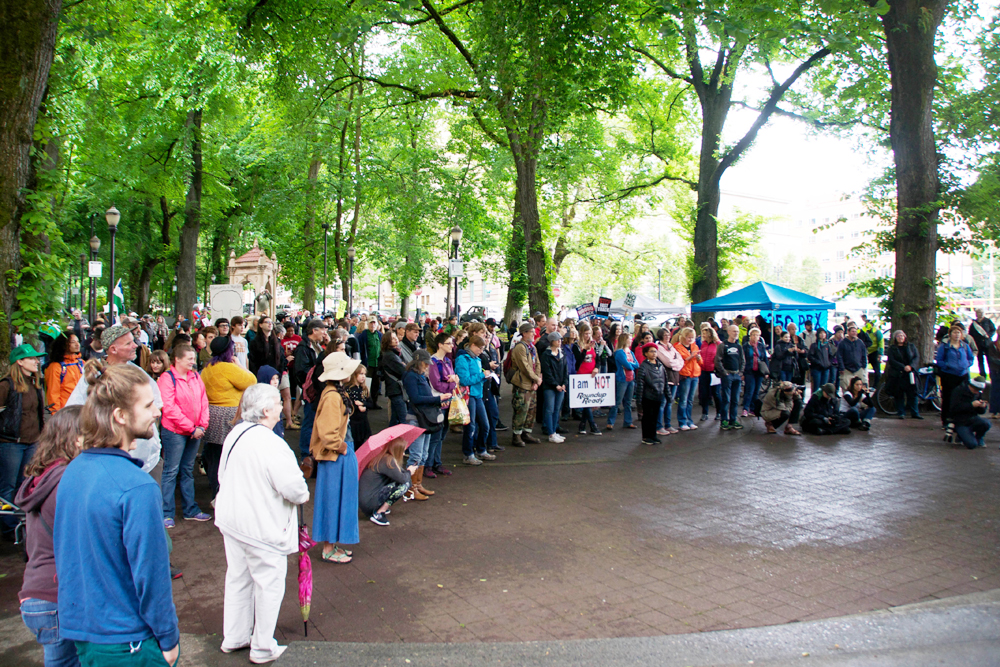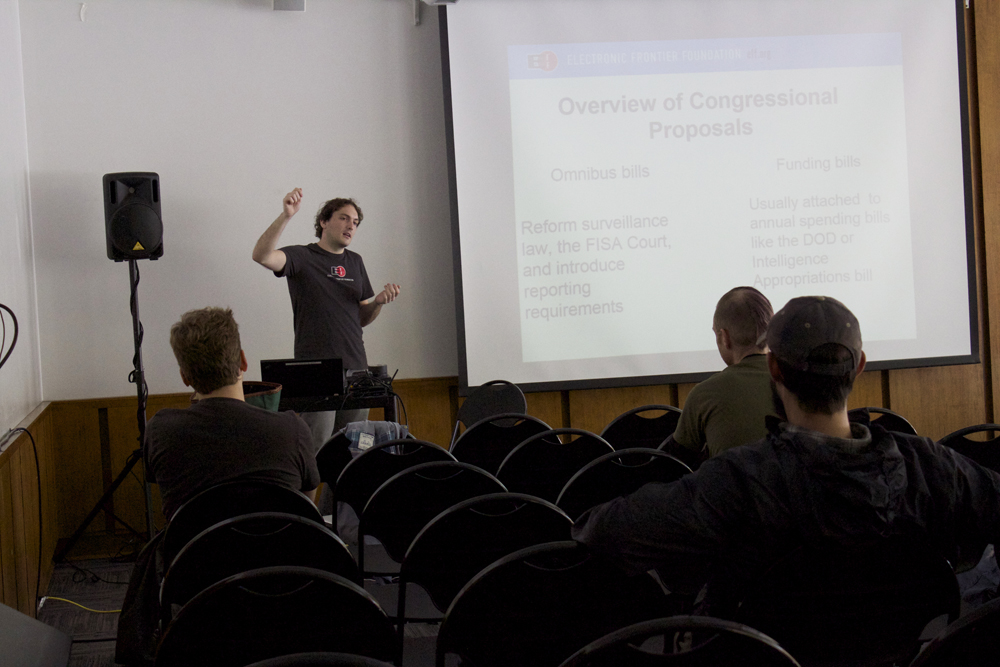About 400 people of all ages joined this year’s March Against Monsanto on May 23, themed “Food for Justice,” in Downtown Portland. The movement took place in 38 countries and 428 cities around the world.
The march was a peaceful protest against the Monsanto Company, which has been critiqued for its production of genetically modified seeds and an herbicide named Roundup. This was the third march of its kind in Portland.
The protesters criticized the food system as a whole, with its focus on industrialized agriculture and political decisions that impact food safety, such as House Bills 2509 and 3212 and the Trans-Pacific Partnership.
“We stand for farmers, families, bees and seeds,” said Teressa Raiford from Don’t Shoot PDX. “We want to know what is in our food!”
GMO Free Oregon, 350 PDX, Oregon Fair Trade Campaign, Biosafety Alliance and Portland Rising Tide were co-sponsors of the event.
Marian Bell, an environmental studies student at Portland State, marched with her young daughter.
“I want to be able to choose whether I have genetically modified food or not,” she said. “For me, it is a concern what the effects are on my daughter in 30 years if I fed her nothing but chemically produced food.”
Monsanto, with headquarters in St. Louis, Missouri, operates in about 66 countries. Roundup was first commercialized in 1968 in the U.S. and has been constantly developed since.
Roundup, which is Monsanto’s bestselling herbicide, was recently linked to cancer by the World Health Organization’s International Agency for Research group, who listed it as a probable carcinogen. Traces of the product were found in water of areas where it was used.
Roundup is made from a glyphosate, a synthetic compound that is a non-selective systemic herbicide particularly effective against perennial weeds. It’s the most commonly used herbicide in private gardening as well as in agriculture worldwide.
Many consumers in the U.S. have shown support for national GMO labeling, but so far no initiative has been successful. According to the event’s press release on MAM’s international homepage, the reason for a lack of initiatives is “heavy spending by Monsanto-backed lobbying groups.”
“This year we call for food justice now and stand against the Trans-Pacific Partnership agreement that would suborn the legislative will of those countries who have banned GMOs,” said Leuth Novotny from Portland’s MAM organization team.
The TPP is a trade agreement with 11 countries in the Asia Pacific, which is currently being pushed by the Obama administration. Among others, it would prohibit the labeling of GMOs. The New York Times recently called the TPP “a blatant attack on labor, farmers, food safety, public health and even national sovereignty.”
“Let’s really think about the longer-term picture, how we bring this movement forward and continue to change and work with all the other organizations, and not just show up and say, ‘Hey, we’re really pissed by the system,’ and then we all go home,” said Karen Swift of Biosafety Alliance.
Portland’s protesters shouted, “Don’t attack our democracy,” and sang, “All we are saying is give labels a chance,” while marching. Though performers like Laura Ivancie and Tongue-N-Groove put people in good humor, the urgency of the event participants was clear.
Different studies state different opinions about the impact of GMOs, which often lead to confusion and political discussion between advocates and opponents.
In addition to supporters of the MAM movement, there was a small group of contradictors.
“We support biotechnology and want to offer another perspective about GMOs,” said Sarah Bryant, a biology student at PSU. “The majority of scientists say that GMOs are safe and that there are many benefits.”





I’m pretty disappointed by this, in all honesty. It seriously feels like you threw in the sentence about the counter protest at the very end as an after-thought. You gave four quotes and the entire story to fear-mongering and left all of the science and reasoning out of the story. I feel it’s pretty sensationalist to legitimize this kind of anti-science activism by allowing 98 percent of the story to be about nonsense and flippantly mentioning at the end that there was a “small group of contradictors.” In fact, there was a group of 20 people there holding up pro-GMO signs, passing out fact-based literature and having real conversations with people about what the science says. Not to mention the fact that Roundup is not made of “a glyphosate.” Roundup is the brand name for glyphosate. In the same way that Tylenol is the brand name for acetaminophen; Tylenol is not made of “an acetaminophen.” This could have been clarified for you if you’d bothered to talk at length to any of the 20 people there who knew more about the science than the author of this article.
The author did not do research of fact checking for this article. The 2 protesters interviewed claimed they wanted to know what is in their food. As if they could not know under current circumstances. Incorrect. there are labels organic and non-gmo project that can be used to determine the lack of presence of g.e. crops in a product. Also the scientific consensus that g.e. crops are as safe as any other method of production is not mentioned. Very poor article folks.
I’m surprised that this wasn’t published under the opinion section when it’s more or less just a page of fear-mongering, pseudoscientific editorial writing in favor of the protesters.
“Different studies state different opinions about the impact of GMOs, which often lead to confusion and political discussion between advocates and opponents.”
This is about on par with saying that “Different studies state different opinions about the reality of global warming…” And studies don’t state opinions; that’s utterly contradictory to the point of conducting a study in the first place.